|
|
|
Sort Order |
|
|
|
Items / Page
|
|
|
|
|
|
|
| Srl | Item |
| 1 |
ID:
086578
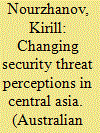

|
|
|
|
|
| Publication |
2009.
|
| Summary/Abstract |
This article discusses the current process of securitisation in Central Asia and identifies its convoluted and faulty nature as a factor impeding collective security action in the region. It uses the Regional Security Complex Theory (RSCT) as an explanatory tool and posits that security discourse in - and about - the five former Soviet republics is dominated by geopolitical grand strategy on the one hand and by particularist concerns about lack of democracy or transnational threats on the other. Issues of conventional security involving two or more states, such as territorial disputes or resource management, are pushed aside and rarely securitised at the official level. The article outlines conceptual and institutional reasons for this bias, and argues that unless inter-state tensions are properly analysed, debated and addressed, the prospects for security and stability in the region will remain grim.
|
|
|
|
|
|
|
|
|
|
|
|
|
|
|
|
| 2 |
ID:
086572
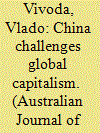

|
|
|
|
|
| Publication |
2009.
|
| Summary/Abstract |
This paper establishes a novel understanding of the nature and implications of China's rise. By borrowing Robert Gilpin's concept of sub-optimisation, it is argued that China is the most prominent player in a non-Western subgroup's suboptimisation strategy, which undermines the Western-dominated neoliberal capitalist system, or the Washington Consensus, and liberal democratic values, taken as gospel by Western economists, governments and industry for the past 30 years. While China and other non-Western states are a part of this system, a consequence of their actions within the system, and particularly in the international energy markets, is that they are increasing their relative gains at the expense of the larger group. China-led subgroup's suboptimisation strategy may result in direct competition between the predominant neoliberal Western paradigm, which is synonymous with globalisation, and which has entered into a structural crisis, and the emerging non-Western economic and political capitalist model.
|
|
|
|
|
|
|
|
|
|
|
|
|
|
|
|
| 3 |
ID:
086576
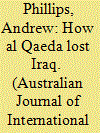

|
|
|
|
|
| Publication |
2009.
|
| Summary/Abstract |
Al Qaeda in Iraq (AQI) has suffered a grave setback in the context of its ongoing campaign there. Since late 2006 Sunni tribal militias working in conjunction with Coalition forces have decimated AQI's ranks, and the organisation has been largely expelled from its former sanctuaries in western Iraq. This article seeks to explain the causes of al Qaeda's defeat with a view towards drawing out their broader implications for the ongoing struggle against jihadist terrorism. I argue that AQI's defeat can be ascribed to its ideological inflexibility, its penchant for indiscriminate violence, and its absolute unwillingness to accommodate the sensitivities and political interests of its host communities. Furthermore, I argue that, far from being exceptional, al Qaeda's mishandling of its local allies in Iraq represents merely the latest instance of a tendency to alienate host communities that has long been evident in its involvement in conflicts in the Islamic world. My analysis confirms that al Qaeda's ideological extremism constitutes a vital point of vulnerability, and that it remains possible to pry global jihadists away from their host communities even in the context of ongoing high-intensity conflicts.
|
|
|
|
|
|
|
|
|
|
|
|
|
|
|
|
| 4 |
ID:
086574
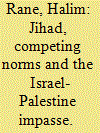

|
|
|
|
|
| Publication |
2009.
|
| Summary/Abstract |
A central factor in the failure to resolve the Israel-Palestine conflict is the direct competition that exists between its two most central international norms: 'self-determination', the fundamental claim of the Palestinians, and 'self-defence', the overriding concern of Israelis. Particularly since 9/11, Palestinian violence has been a liability for their cause and has served to validate Israel's self-defence arguments. Increasingly, Palestinian violence has been perpetrated by the Islamically oriented under the banner of jihad, which is understood almost exclusively in terms of armed struggle. Non-violence - which has the potential to undermine Israel's self-defence arguments and generate external pressure on Israel to adhere to the terms of a just peace - has been under-appreciated by such Palestinians. Non-violence is far from having a normative status in the Muslim world as an Islamically legitimate response to occupation and it is yet to be conceptualised as an effective form of resistance. The concept needs to be reformulated in accordance with the realities and opportunities confronting the Palestinians. Contextualisation combined with a maqasid or objective-oriented approach establishes non-violence as a preferable option to violence both in terms of the higher objectives of jihad, enshrined in the Quran, as well as of the attainment of Palestinian self-determination.
|
|
|
|
|
|
|
|
|
|
|
|
|
|
|
|
| 5 |
ID:
086579


|
|
|
|
|
| Publication |
2009.
|
| Summary/Abstract |
For the past two decades relations between North Korea and the United States have become increasingly hostile. Pervasive and vociferous criticism of North Korea's dangerous and seemingly irrational behaviour has focused on Pyongyang's use of nuclear brinkmanship, violations of human rights and general disregard for the well-being of the North Korean people, as exemplified by its decision to develop a nuclear programme while the country suffered from widespread famine. However, an alternate view put forth by both American and South Korean experts on North Korea holds that Pyongyang's use of the nuclear wager primarily has been intended to demand Washington's attention in order to initiate bilateral talks and eventually normalise relations with the US. Certainly, Pyongyang's actions have been ham-fisted at times; however, its commitment to the goal of normalisation has been unwavering. The current controversy regarding North Korea's nuclear programme may serve as a necessary step to build trust between Washington and Pyongyang and might continue for sometime, given the short history of direct engagement. However, one thing is clear: neither Washington nor Pyongyang can afford to go back to the starting point.
|
|
|
|
|
|
|
|
|
|
|
|
|
|
|
|
| 6 |
ID:
086570
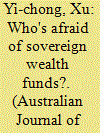

|
|
|
|
|
| Publication |
2009.
|
| Summary/Abstract |
A spectre is stalking the world: the spectre of a rich Chinese state buying strategic resources, hollowing out companies, gobbling up financial institutions and threatening the sovereignty of the countries in whose resources and companies it invests. The China Investment Corporation (CIC) - a sovereign wealth fund company (SWF) - is the stalking horse of the Chinese state. Using the CIC as an example, this article argues that the warning about SWFs has little to do with their size, the speed of their growth or what SWFs have or have not done. It is about a shifting power relationship in the global economy. This broader realignment may have been occurring slowly, but it is happening. Neither side - those who have been writing the rules of the game for international political economy and those who are historically rule-takers - is fully willing to acknowledge the shift and take responsibility to build a new architecture of an international financial system that can accommodate interests of old and new players.
|
|
|
|
|
|
|
|
|
|
|
|
|
|
|
|
|
|
|
|
|